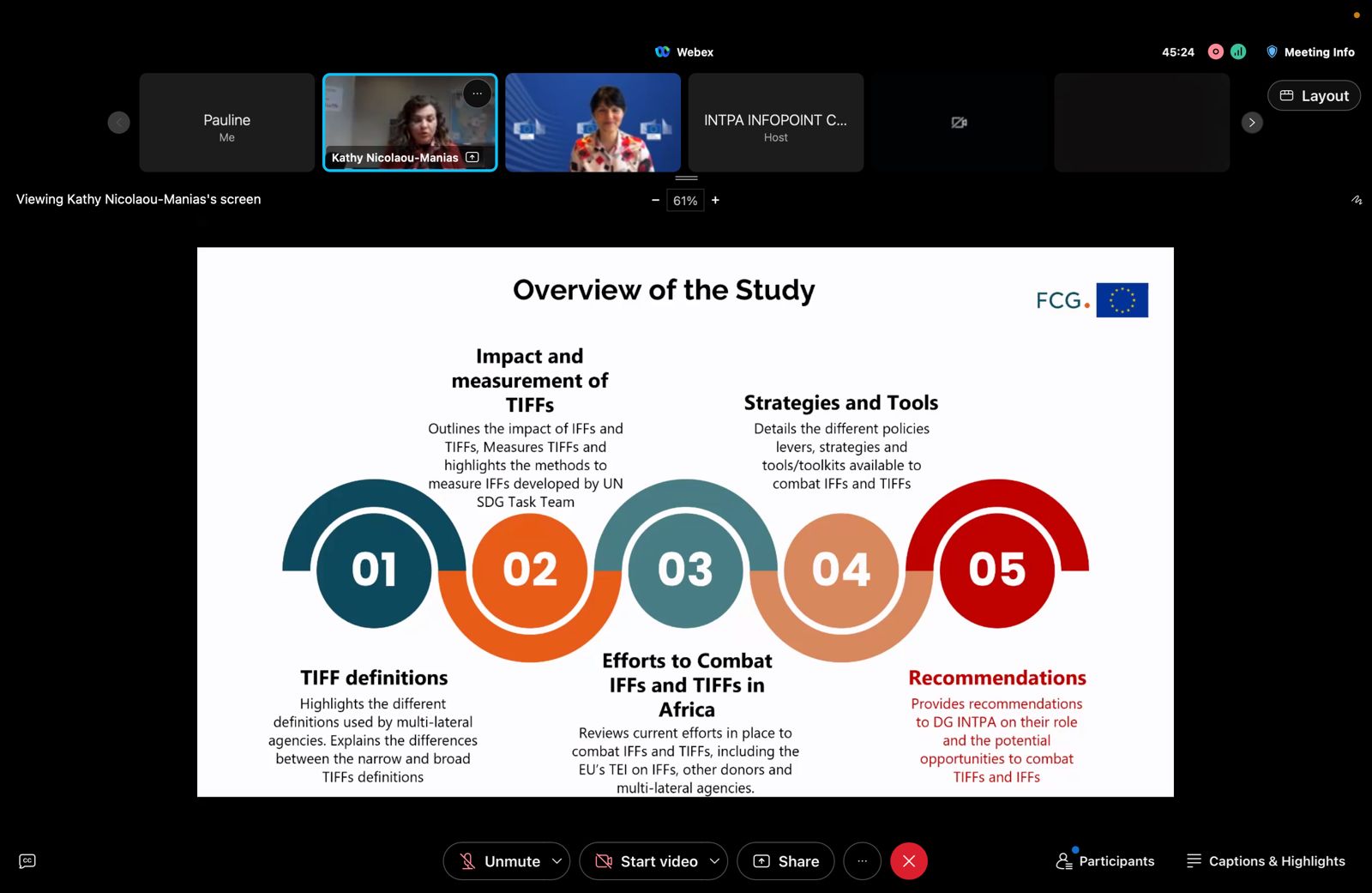Date

High-level discussions on a recent study on Tax-Motivated Illicit Financial Flows recommended that countries must strengthen international cooperation, collaboration and coordination to combat illicit financial flows. The discussions took place at the European Commission’s InfoPoint conference themed ‘Fostering Change: Tax-motivated illicit financial flows’ held on May 17, 2024.
Speaking at the conference, TJNA’s Executive Director Chenai Mukumba emphasised the importance of having the definition of IFFs include tax evasion and other benefits that emanate from transnational crimes, bribery, embezzlement, and other illegal activities. This broad definition allows for more effective policymaking, fostering international cooperation and enhancing transparency.
“A holistic definition of illicit financial flows is key in developing comprehensive measures to address not only illegal but also ethically questionable illicit financial activities to capture the full scope of financial pressures undermining Africa’s economic stability,” she noted.
The study notes that low-income countries, which collect only about half the tax revenue as a share of GDP compared to advanced economies, are particularly vulnerable to illicit financial flows. The financial leakage in Africa is approximately a $90 billion annual loss, which is equivalent to the last replenishment of the International Development Association. Additionally, $220 billion is lost yearly to tax avoidance and incentives provided to multinational enterprises. These losses account for about 75% of the estimated $500 billion needed annually to finance development in Africa.
“Illicit financial flows are depriving the continent of approximately $390 billion a year, approximately 75% of the amount needed to finance development in Africa. So, the fight against illicit financial flows is a developmental issue as it impedes our ability to mobilise domestic resources and to channelled to investment in productive sectors such as agriculture, industry and services to drive inclusive growth and sustainable development,” Dr. Patrick Ndzana Olomo, Ag. Head Economic Policy and Sustainable Development, Department of Economic Affairs at the African Union Commission.
The discussions underscored that regional efforts and international cooperation are important in combating illicit financial flows. Notably, the African Union Commission, TJNA, African Tax Administration Forum (ATAF) and other regional bodies have developed technical and legal instruments to tackle illicit financial flows in Africa.
Ms Mukumba highlighted that TJNA is working with the African Union and ATAF to pilot the anti- illicit financial flows policy tracker tool in six African countries. This policy tracker will help countries assess the extent to which they are putting in place measures to address the recommendations from high-level panel reports, such as the Mbeki Panel, to curb illicit financial flows.
She also underscored the role of civil society organisations in raising awareness, building capacity, and advocating for policy reforms. Placing citizens at the core of these conversations ensures that the implications of illicit financial flows on public services, such as education and healthcare, are clearly understood and addressed.
Speaking at the conference, Mr Logan Wort, ATAF’s Executive Secretary noted that ATAF has been instrumental in developing model tax treaties and guidelines that provide practical tools for countries to strengthen their tax systems. Notably, ATAF has developed and implemented a six-pillar approach to addressing tax-related illicit financial flows on the continent. These pillars are:
-
Cross-border transactions and aggressive tax planning.
-
Transparency and tax treaties, improving the exchange of information and strengthening treaty networks.
-
Customs and trade solutions, focusing on trade mispricing.
-
Data, statistics, and analysis for measuring gains.
-
In-country efforts to strengthen legal and policy frameworks and operational inter-agency cooperation.
-
Advocacy and public interest litigation to ensure that citizens are central to the conversation.
Further, global collaborative efforts are critical in combating illicit financial flows. Karolina Leib, European Commission (EU) noted that the urgency to combat tax-motivated illicit financial flows is not only a fiscal necessity but also a matter of social fairness, hence a priority for the EU. She further highlighted that the EU works to curb tax evasion and tax avoidance by contributing to multilateral initiatives like the Addis tax initiative and the UN Tax Committee, as well as working with civil society organisations.
“As the momentum is building for reforms in global tax governance, international cooperation is key. The EU is engaging in discussions at the UN on a new Framework Convention on International Tax Cooperation, as well as in the preparation of the fourth conference on Financing for Development, which will take place later next year,” she noted.
Related Resources